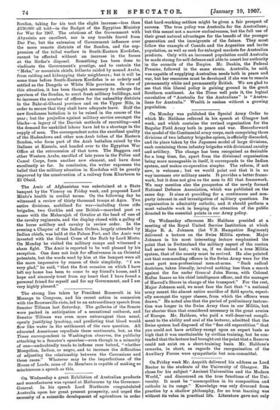On Wednesday afternoon Mr. Haldane presided at a meeting of
the Royal United Service Institution at which Major R. A. Johnson (1st V.B. Hampshire Regimentl delivered a lecture on the Swiss Militia system. Major Johnson in his most interesting lecture emphasised the point that in Switzerland the military aspect of the canton had never been lost; with us, if we desired a true Militia system, that of the county must be revived. He also pointed out that commanding officers in the Swiss Army were for the most part non-professional men-at-arms. " Such radical doctrines, taken literally, involved nothing leas than a march against the foe under General John Burns, with Colonel. Rufus Isaacs as his chief intelligence officer, and the manager of Harrod's Stores in charge of the transport." For the rest, Major Johnson said, we must face the fact that " a national army meant the almost entire sacrifice of field sports, especi- ally amongst the upper classes, from which the officers were drawn." He noted also that the period of preliminary instruc- tion was longer in the Swiss Army than in our Militia, but far shorter than that considered necessary in the great armies of Europe. Mr. Haldane, who paid a well-deserved compli- went to the ability and zeal of the lecturer, admitted that the Swiss system had disposed of the "fine old superstition" that you could not have artillery except upon an expert basis so high that it was unattainable by civilian training, but he con- tended that the lecture bad brought out the point that a Reserve could not exist on a short-training basis. Mr. Haldane's remarks, in short, as regards the reorganisation of the Auxiliary Forces were sympathetic but non-committal.






































 Previous page
Previous page